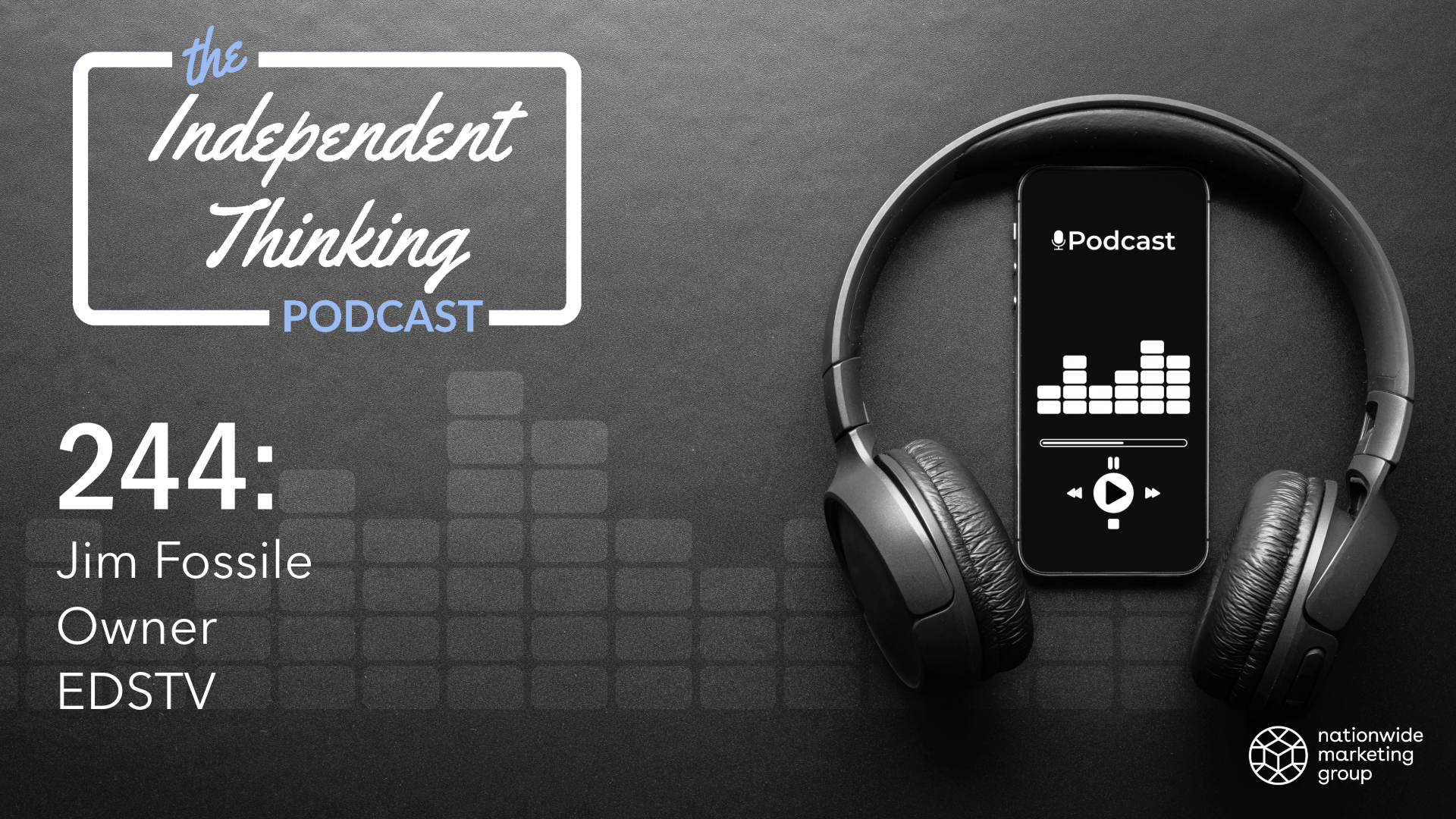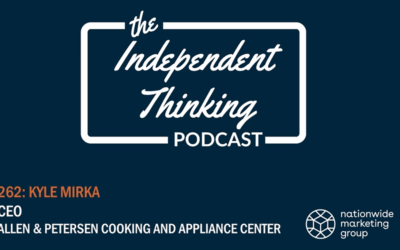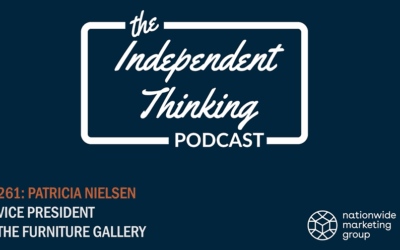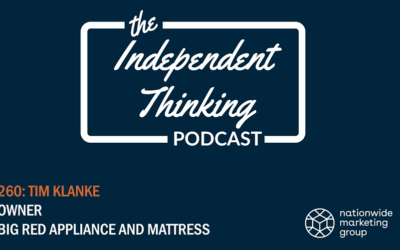To remain in business for nearly 40 years in the electronics and custom integration space, a business needs – and its people – need to understand what it means to evolve and adapt. That’s exactly what Jim Fossile, owner of EDSTV in the suburbs of Philadelphia, has done in a variety of ways. We swung by their showroom to dive into it all.
Rob Stott: All right, we are back on the Independent Thinking Podcast. I got to say, this is the first opportunity for me to pop right down the road from my house to record a podcast. So Mr. Jim Fossile, I appreciate it.
Jim Fossile: Hello.
Rob Stott: Thank you for having me in your store here out. Colmar, right? Colmar, PA?
Jim Fossile: Colmar, or Bucks, Montgomery County so Colmar’s like a little PO box.
Rob Stott: Right down the road. 309 connects us, not too far from one another. Owner of Ed’s TV, appreciate you inviting me in and doing a podcast with us. Beautiful, yeah.
Jim Fossile: Thanks for the invite.
Rob Stott: Yeah, absolutely. So Ed’s, give us a little background on the business itself.
Jim Fossile: Not everybody wants to hear my story, but I’ll tell my story.
Rob Stott: I do.
Jim Fossile: Yeah. So if I go back to the beginning, okay, I was always in retail. I worked at the Sam Goody store, which sold a lot of audio, had a lot of fun with it. Through the ranks, I got promoted to a buyer, which I commuted to Edison, New Jersey. That’s the early ’80s. Back then, the video game business was very popular. So in that category of business, Sam Goody decided to exit that audio category so I was out. They gave me my severance, and it was nine years there.
I got picked up right away by Almo Corporation, which is a national distributor, and they made me director of purchasing, which enabled me to stay in the channel. And then at the same time, business started to flounder a little bit there so they gave me some account responsibility on top of my buying responsibility. And that’s how I met Ed. Ed, that’s where the Ed’s from Ed’s TV is. So this is back in the early ’80s, so almost 40 years ago, 40 years next year.
I always wanted to get back into retail channel. I wanted be on the front line. I had great success with it at the retail level, the buying thing where you were disconnected, the director of purchasing disconnected. So by being in the retail channel, I made things happen. Worked a lot of hours in beginning, was basically a TV repair store, Ed’s TV, that had a good local following. The first thing I did was try to grow the business by my brands, and I knew it was profitable. And my biggest acquisition of brands was Mitsubishi back then, knowing from the wholesale business, because I was a wholesale for Sylvania and Pioneer. I was in a wholesale category for a while and knew what brands were good.
Rob Stott: Right.
Jim Fossile: And again, one of the reasons why I got out of the wholesale business was my success depending on my dealer sell through and buying through distribution didn’t allow the margins that anybody could be successful in this category. You had to buy factory direct. So my biggest thing was getting Mitsubishi as a brand. I rode that lightning in a bottle until the end and it really put us on the map financially. I think a lot of dealers had that success with Mitsubishi. Part of our decline of our business model of course, was the internet. The brand disappeared. Mitsubishi disappeared.
Rob Stott: Sure, yeah.
Jim Fossile: Of course, Panasonic since then disappeared. Pioneer. These were all core brands that really knew the channel very well. Sony’s our core brand now, and again, the margins aren’t the same as Mitsubishi. They didn’t even have the truck, they didn’t have the marketing money. Then of course price erosion became a big pickle. So through the trials and tribulations of retail, we tried to expand the category of business. I had a bed store next to Ed’s TV called Ed’s Beds that we ran for four years.
Rob Stott: Wow.
Jim Fossile: But through the bleeding of 2007, 2008, 2009, we abandoned the bed business because they needed a lot of marketing money and no one was buying beds, because nobody was buying houses.
Rob Stott: Right.
Jim Fossile: We abandoned that business. So financially, everything got a little crazy. People were going out of business. I was hemorrhaging. I bought the shopping center in 2007, sold the shopping center back to my partner, what I put into it to get the equity back in to afford to run my hobby, which is my business and my passion, which is the electronic business, TVs and home theater. So we just stayed long. I had to minimize my staff to a bare minimum to get financially stable there.
Rob Stott: Right.
Jim Fossile: We just followed my passion and worked in a lot of hours. We rode through the storm. I can make a list of 40 brands of neighbors or 40 manufacturers or retailers that are no longer with us that we used to compete head-to-head with the likes of Circus City. Of course, Macy’s, Stereo Discounters, The Wiz, Crazy Eddie. I mean TV Stereo Town.
Rob Stott: You’re listing off a lot, even I’m just thinking in this area too. You all-
Jim Fossile: That’s all in the backyard].
Rob Stott: I know. It’s unbelievable.
Jim Fossile: American Appliance, Deez.
Rob Stott: It’s unbelievable.
Jim Fossile: These were all retailers. Sassafras Stereo, Sounddex down by Willow Grove. These were all people that were in my channel that didn’t either decide to call it quits or some other reason. High Fi House, they’re very strong brand. John Robbins was very helpful to us with getting merchandise back during when we couldn’t get merchandise. But everybody disappeared. And price erosion, price erosion of the product. We got to sell four times more product items today to make the same volume-
Rob Stott: Right.
Jim Fossile: … that we did going back 20 years ago.
Rob Stott: What I love about your story though is that if you listen to it, the experimentation and trying things and doing that, is that just natural for you? Or is that something that was learned over time? Talk about that a little bit. Whether it works or doesn’t, right? The fact that you’re willing to step out.
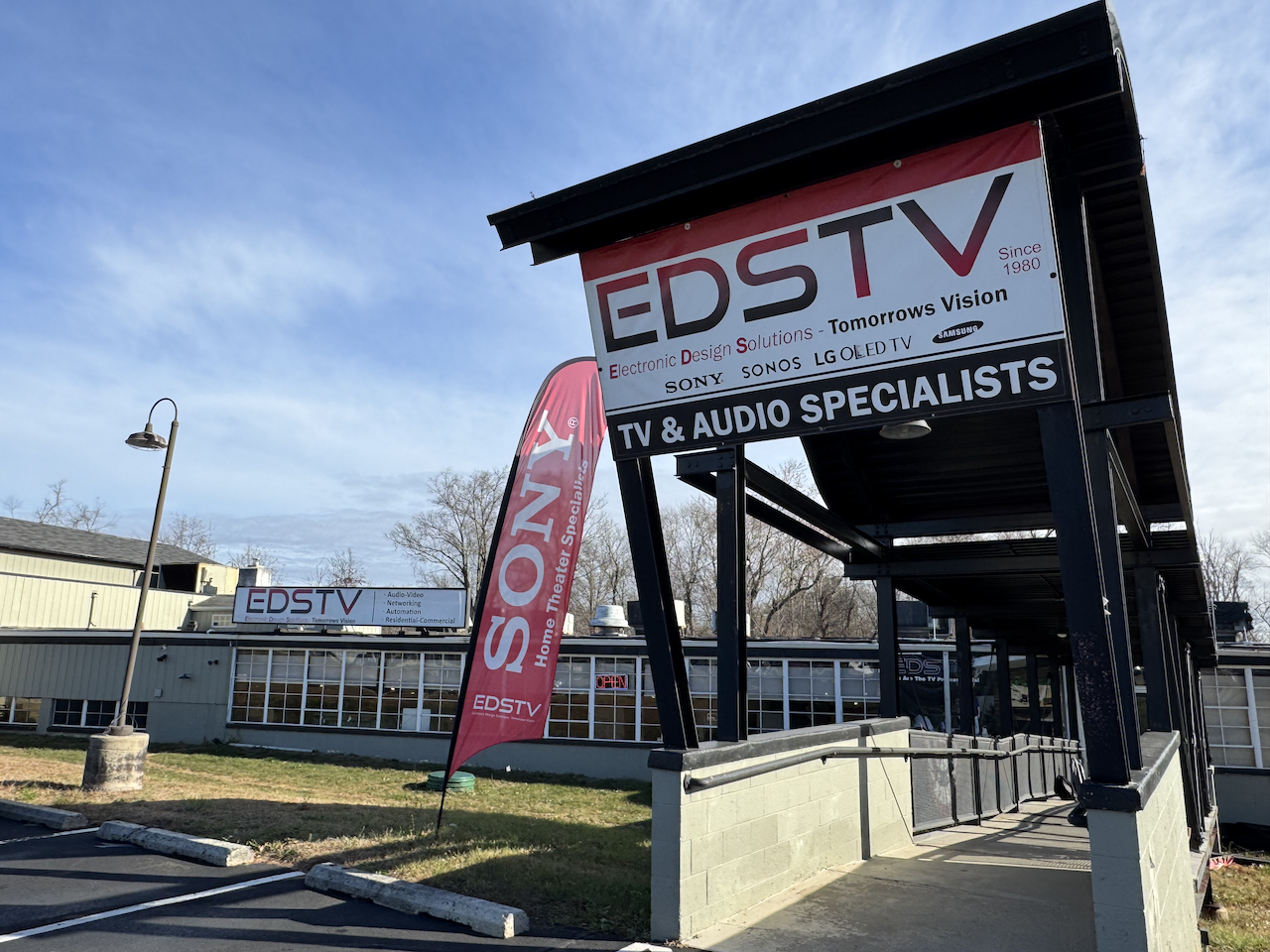
Jim Fossile: Since then I got very spiritual and nothing’s a coincidence in life. God put me in the path of a lot of people that assist me, for no good reason other than me being a nice person maybe, and giving me the opportunity to have this conversation with you today. I told my wife when we moved the store to this new location nine years ago, which is a unique setup because we share space with Leather Expressions, which is a brand new category killer. They do mostly all leather, Natuzzi, MaxDivani. We co-inhabitate this space with the theater rooms that are set up with their MaxDivani and Natuzzi fine leather. Of course we do custom Amish furniture, which goes hand in hand. We do the Amish and we do BDI and Salamander because that’s a profitable category and it goes hand in hand as far as decorating the room. A lot of what we sell is not just a TV, like a Best Buy on the wall.
Rob Stott: Right.
Jim Fossile: We sell a concept of a room.
Rob Stott: Right.
Jim Fossile: We have theater room set up in here, which you have the space affordably to leave to do that because the building is dated and old that we occupy, but we dialed it up on the inside. We have a virtual tour in our website so people can see what the store looks like. We created a virtual tour like you do with real estate guys. People can get an idea what they’re walking into before they walk in so that we’re not just a tube tester in a corner.
Rob Stott: Right.
Jim Fossile: A couple of TVs set up and then we just happen to hodge podge it because we have a great presentation. But the location we share with the Leather Expressions, his customer is my customer, my customer is his customer. And we get great synergy between the two and affordability of real estate because we co-inhabitate this building with the heat and air conditioning electric and the internet. Again, the synergy works great.
Rob Stott: Yeah, absolutely. So talk about the name itself, right? Obviously an homage to previous owner.
Jim Fossile: Yeah, so there was a guy named Ed, okay? He still does business. According to him, we stole all of his customers. So when I moved the showroom, I thought that Ed’s TV was sounded hokey. It sounded like something out of the ’70s, which it is. We tried to acclimate the name to use the same name, but we still say Ed’s TV, but we put this sub Ed, it’s Electronics Design Solutions, Tomorrow’s Vision, knowing that our category of business in the TV category is very limited as far as profitability.
We do more integration. Integration with Control4, with ELAN. We do dimmers and home theater, surveillance cameras, all these categories that are more profitable than selling a TV of course, but they require professionalism. We have 40 years of me doing this in my store here. This is the third location. But we have a lot of repeat customers and customer loyalty that really drives, makes it easy for us because our customers know us. It’s very hard to procure new customers, we know that. Customer acquisition is very expensive.
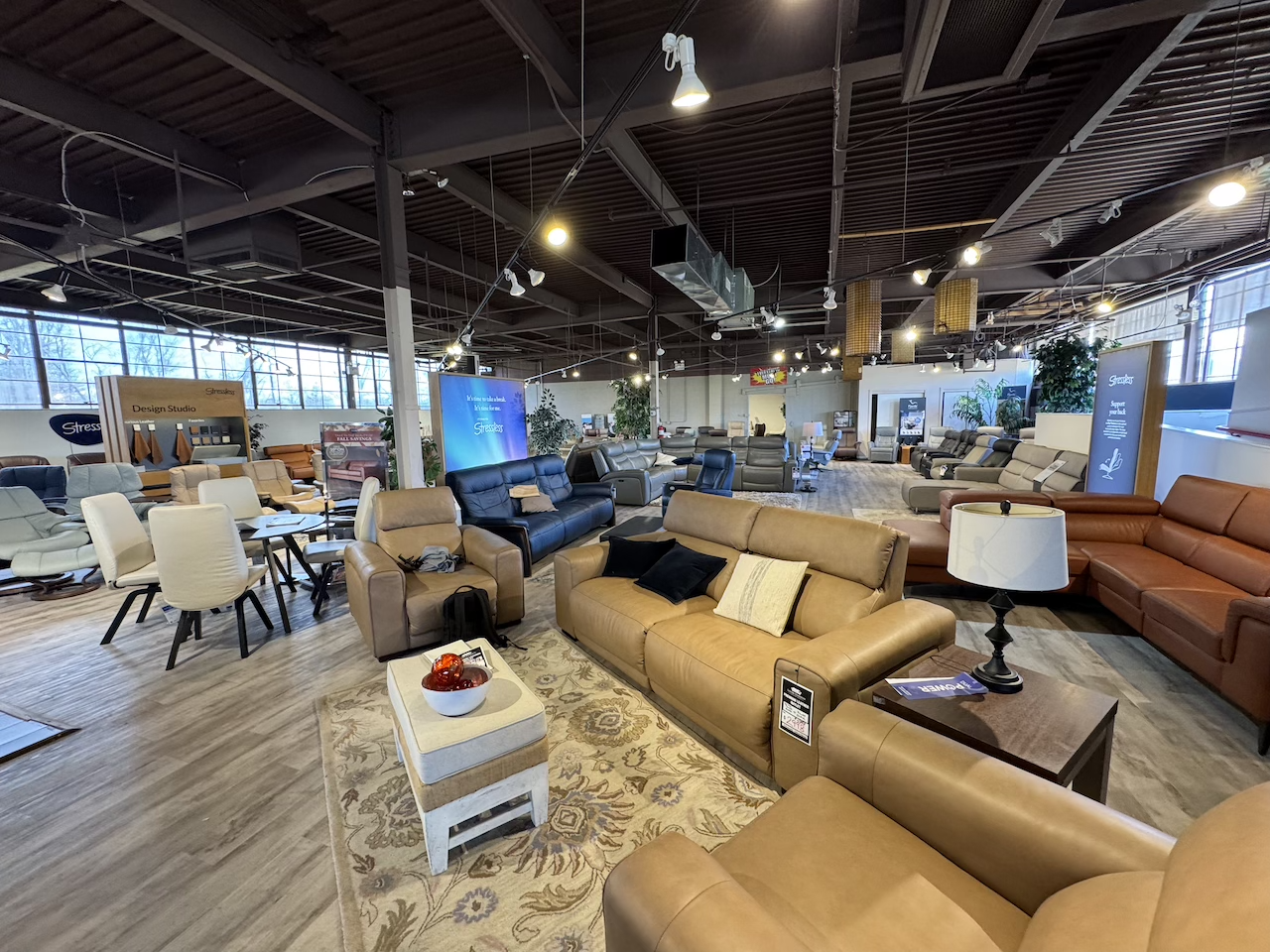
A lot of our customers are repeat. The only problem is 40 years being in business, a lot of our customers sadly are dying or moving out there and so we can’t keep them. So we have to get new blood. We tried to modernize our name that people would associate with something more sexy or more dynamic than Ed’s TV; Electronics Design Solutions, Tomorrow’s Vision. But when you go back to it, it’s still Ed’s TV.
Rob Stott: Right. Well, that’s something too, the point you bring up about customers and where you find them. I know it’s a big topic of discussion across the industry, whether we’re in Philly, in the outskirts of Philly or you could be on the other side of the country, other coast, customer acquisition’s a big deal. So what’s been working for you or what sort of approaches are you taking?
Jim Fossile: Years ago, we did every Sports Philly event. We had cable TV going on Comcast with every Flyer, Sixers, and it drove the business dramatically off the charts. Then again said before, that recipe wore out because it was very expensive. Then Verizon’s now in the category, so they had their own cable network, and then you had the Comcast network and people were now streaming. We abandoned that category because again, we had a lot of funding was created by Mitsubishi, Panasonic. I’m talking tunes of $100,000, $200,000 a year to fund the machine.
Rob Stott: Wow.
Jim Fossile: 2007, 2008 came, that money dried up. When the money dried up, the sales dried up because you couldn’t afford to run that myself. And then of course, when margins dried up, you couldn’t take it out of the profit of the product because it wasn’t there to be taken. So the MDF money they call it was, and we’re still affluent, we’re still asking for MDF money, we’re still asking for vendor participation. So without the vendor participation, it’s very difficult to compete against on a customer acquisition to an Amazon to a Best Buy where they have a lot of marketing funds available to gain that customer. We do it by reviews now.
Rob Stott: Okay.
Jim Fossile: Our big thing now is reviews. We had the luxury of finding a company called Podium in the last two months. Podium does, it’s something that we get through Nationwide. It can text on our phone line, so we got rid of the phone line system and everything’s voice to IP. All our cell phones ring when the store… Set the hours before and after closing so we can answer before and after so we can answer the phone live even when I’m driving in the car.
Rob Stott: Right.
Jim Fossile: Or I’m doing something else or anybody can answer, because you don’t want to lose that customer. But a lot of it’s just follow up or technical situations or people have simple questions because nothing works the way it’s supposed to work for a long period of time.
Rob Stott: Right.
Jim Fossile: That’s one of the problems of our business is that customers they want, they need that helping hand. That’s what we provide. We provide, we’re their guy.
Rob Stott: Right.
Jim Fossile: Something doesn’t work right with the guy and they call us, but they can’t call the cable company calls because they don’t answer a phone. No one wants to bug their kids because our customers are old, so they call us up and we come up with a solution. The Podium enables us to text customers back, which is really big thing now, people can call and they leave a message, they leave a text on our voice line. The beauty of it is that they know that can get back to them within the next 30 seconds, but it’s just a comment. You get back to them within the next 10 minutes, they’re satisfied with that answer so nothing falls through the cracks.
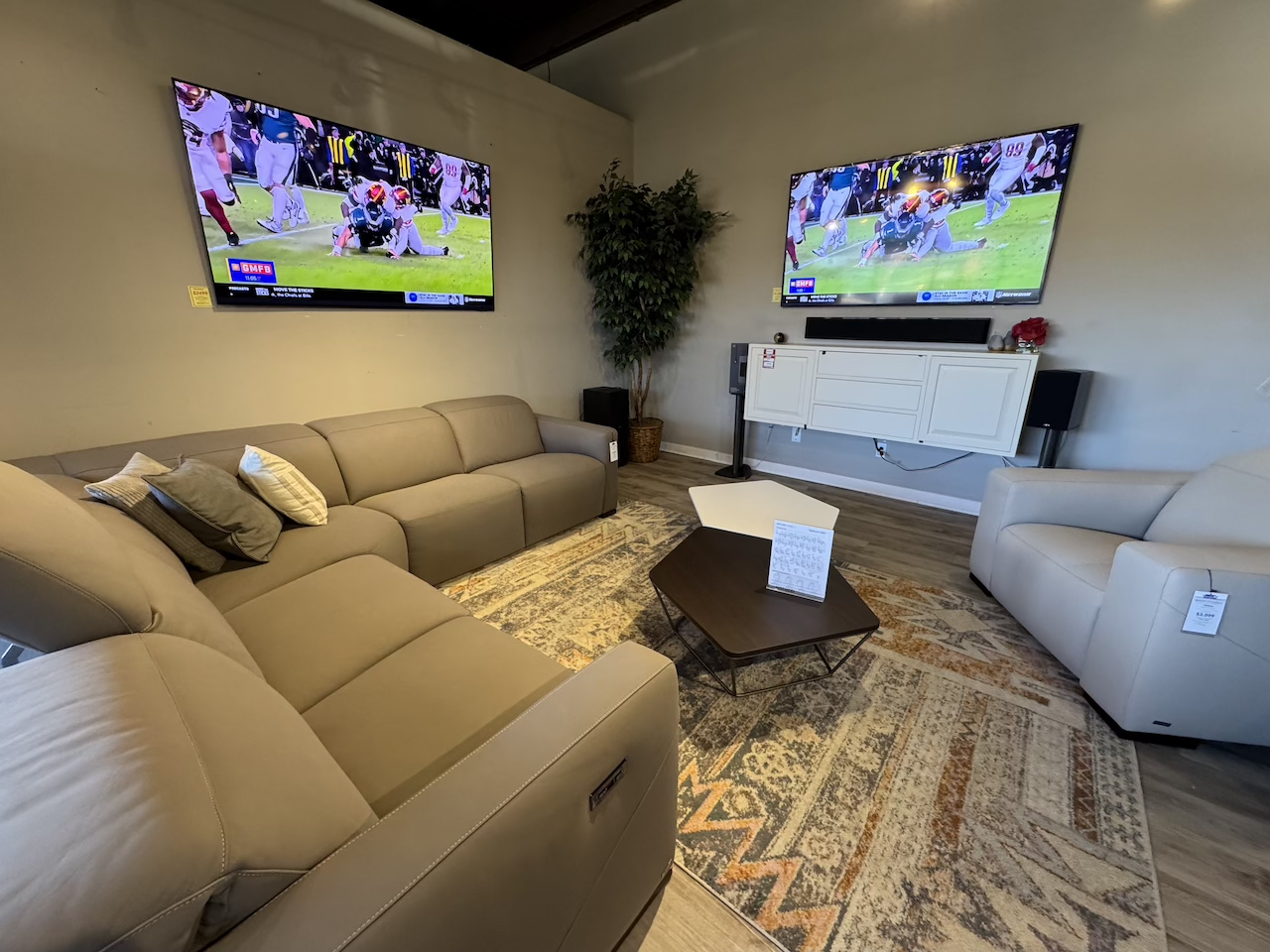
Rob Stott: Right.
Jim Fossile: And then of course the other problem is that it’s not a problem, but we could send payment requests. The customers that finished up a project, you send a text, can you pay this bill? They could do a virtually on their phone and punch your information like you’re buying a pizza, Domino’s. Excuse me, and they could pay the bill so we’re not chasing people down for loose ends.
Rob Stott: Yeah, it’s incredible.
Jim Fossile: It’s a great platform, I’d recommend to anybody, Podium. If you have a business, I mean, sure there’s other platforms that work, but the people at the Podium are very easy to work with. We did have a pickle, we do have Jerry. Jerry’s a virtual AI guy, and the AI guy is supposed to replace an employee.
Rob Stott: Right.
Jim Fossile: We realize that he can’t replace a live person.
Rob Stott: Right.
Jim Fossile: He gives words out to the customer to hold them in place, in line. But so right now we’re trying to pivot around Jerry.
Rob Stott: That’s a line we should probably say so that people that are concerned about AI replacing jobs, not quite yet. We’re not there yet.
Jim Fossile: Yeah, right, so it won’t replace my job. Jerry could probably replace somebody, but our questions and answers are too.
Rob Stott: A little bit different in this industry. No, that’s awesome though. I love too the fact that you mentioned that, being the guy for the customer, right? If they’re not coming in… Industries evolve, and we’ve seen that with whether it’s the product they’re coming in for, or the reason they’re coming in for, right? So they need that help. That’s almost the entry point for them as a customer these days is that something’s not working and they need someone that can fix it, that they can trust and turn to. And then that person eventually when you provide that solution, you help them with whatever they’re facing, then they turn into that customer.
Jim Fossile: Right, and again, that’s where we come in. Or the other tool that we use now is begin a big tool from Nationwide is the mail-in rebate.
Rob Stott: Yeah, absolutely.
Jim Fossile: Okay. Every quarter, they run the rebate, mail and rebate for installation, delivery and setup. Someone does come in, and so we end up boosting the installation costs a little bit higher. No, they’re going to get reimbursed. On the back end, 150, $100 dollars, 250 on some TVs that covers their costs on it with a Visa gift card. It affords us to be a little more profitable. I could charge more, and without the customer feel like we’re jackknifing them so they know they’re getting some of it back.
Rob Stott: Yeah, absolutely.
Jim Fossile: Which big box stores don’t have that option. They do have other options where they give you a 5%. I mean, Best Buy gives some kind of discount if you open up a credit card. I mean everybody has their tricks that they use. They try to get the price navigated off a map. Pricing, because everything is priced the same.
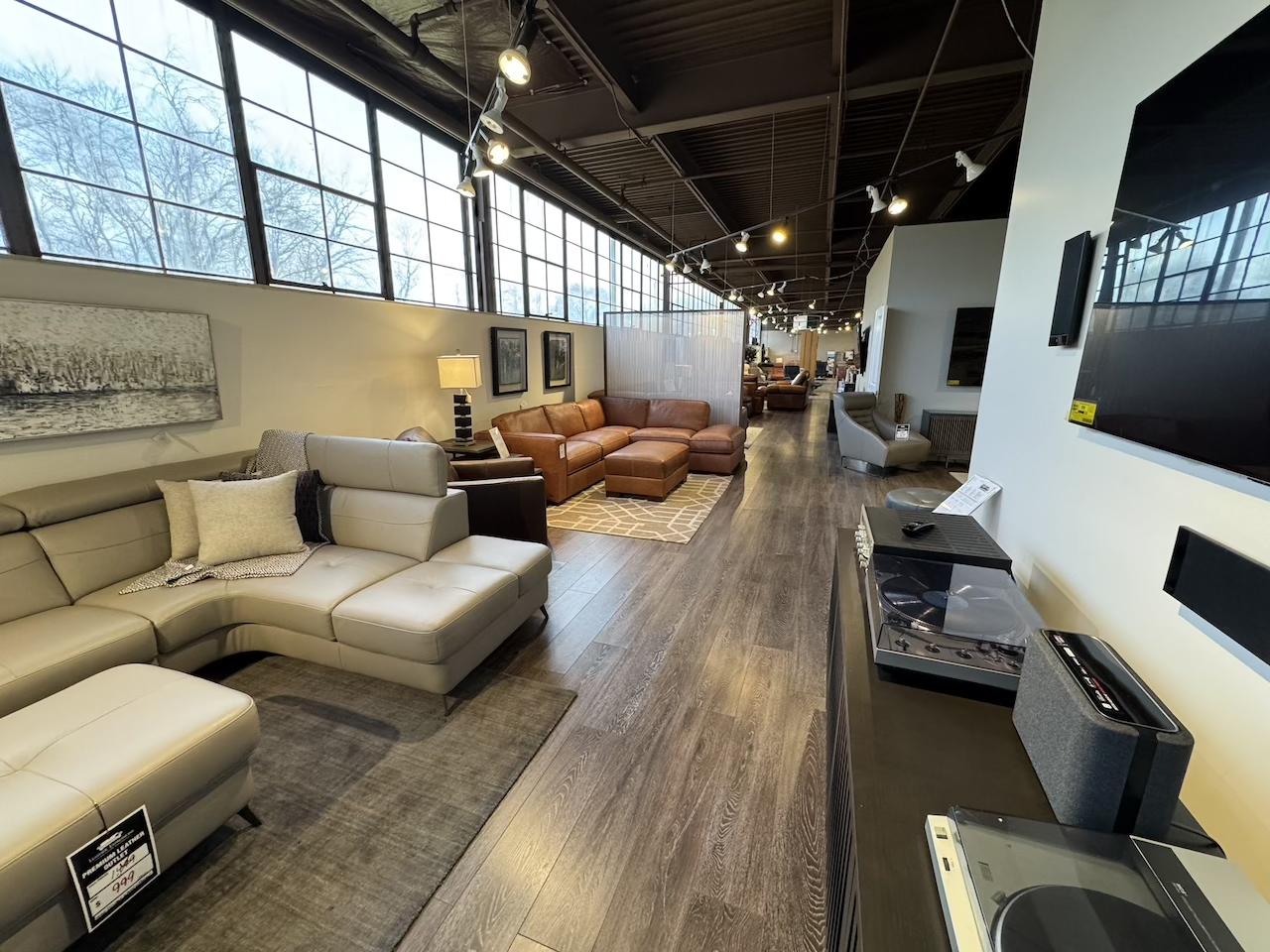
Rob Stott: I know we talked beforehand about this is a passion for you, right? I want to ask about the ability to evolve. You see what’s working in a business, it’s not going to work full time or all the time. You see something like a Mitsubishi, you called it that lightning in a bottle. So how do you as a business owner, what are you looking for or keeping your eye on? Trying to think of all the cliches, how do you keep your finger on the pulse of what’s working for your business?
Jim Fossile: We find out that if you do things that Amazon, Walmart, and Costco and Best Buy can’t do effectively, you leverage that. And again, it’s very hard to promote it. So you find yourself, in order to stay afloat, you do other categories like surveillance cameras, which are very profitable and people now more than ever want their property be secure so you put the little fear in them by you need some cameras.
What also helps is because our showrooms are large and we had it for years, we started with Jay Rambo. We have Amish custom cabinets that we can custom make and this and that. With the leather combination, the integration of the furniture, Salamander, BDI, and the Amish vendors and the customization of cabinets, we have become a solution for people that want something better than they can get at Raymour & Flanagan, or from Wayfair, a knock-down piece of furniture that we can fit their needs exactly. So again, everything helps. It’s compound.
We have our own installers, we have our own service department. What that means, if someone has a pickle, we’re factory authorized, Samsung, LG and Sony. We’re a self-servicing dealer is what they call it. We do things that a lot of retailers have the option of doing. So it puts us, when a customer does come into the showroom, which is again a big problem is traffic. They’re buying from us.
Rob Stott: Right.
Jim Fossile: We give them no reason not to buy from us other than price being an issue on a model that we don’t carry like a Vizio, Westinghouse, TCO. It’s not our wheelhouse. We just tell customers that we sell stuff that I’d buy myself. But the passion part of it is, you talked about. Again, I built my own stereo before when I was in high school and I always liked the music industry and liked my own car radio. I became an electrician by trade. This was a category where every day I show up and is it really work?
I mean, there’s work involved but it’s a really, I mean, it’s just a hobby that turned into a business model that afforded me a lifestyle for almost 40 years. Or actually longer if I kept my Sam Goody days. But it has never been a day at the salt mine where you’re humping and pumping stuff. Even though when we did carry appliances for a year and a half, we thought we can grow that business. Realized that it’s not our, we’re better than that.
Rob Stott: Right.
Jim Fossile: The appliance business is a humping business, and we don’t want to be humpers. Humping heavy stuff I mean.
Rob Stott: Yeah.
Jim Fossile: You know what I’m saying?
Rob Stott: Yeah, we gotcha.
Jim Fossile: Nobody wants to do a 27 cubic foot side by side in a house that only needs a 22 foot and you can’t get through the front door. We’ve been there, done that.
Rob Stott: Yep.
Jim Fossile: Because we’re technical, we do even networking with Wi-Fi extenders. Always people have these problems and so we became a trusting brand because of our time in the business and knowing we have a storefront. I mean, a lot of people do this out of the trunk of their car.
Rob Stott: Right.
Jim Fossile: A lot of people do it out of their garage. They’ll have a website, but they don’t have a storefront.
Rob Stott: Right.
Jim Fossile: So if there’s a pickle or a problem, they feel confident that they can come here, we have equity in our model that we’re here for good.
Rob Stott: When you said it too, a little bit ago about selling the experience, right? We’re sitting in a room right now doing this interview in one of your, I think three or four?
Jim Fossile: Yeah, we have three theater rooms set up.
Rob Stott: Yeah, three theater rooms.
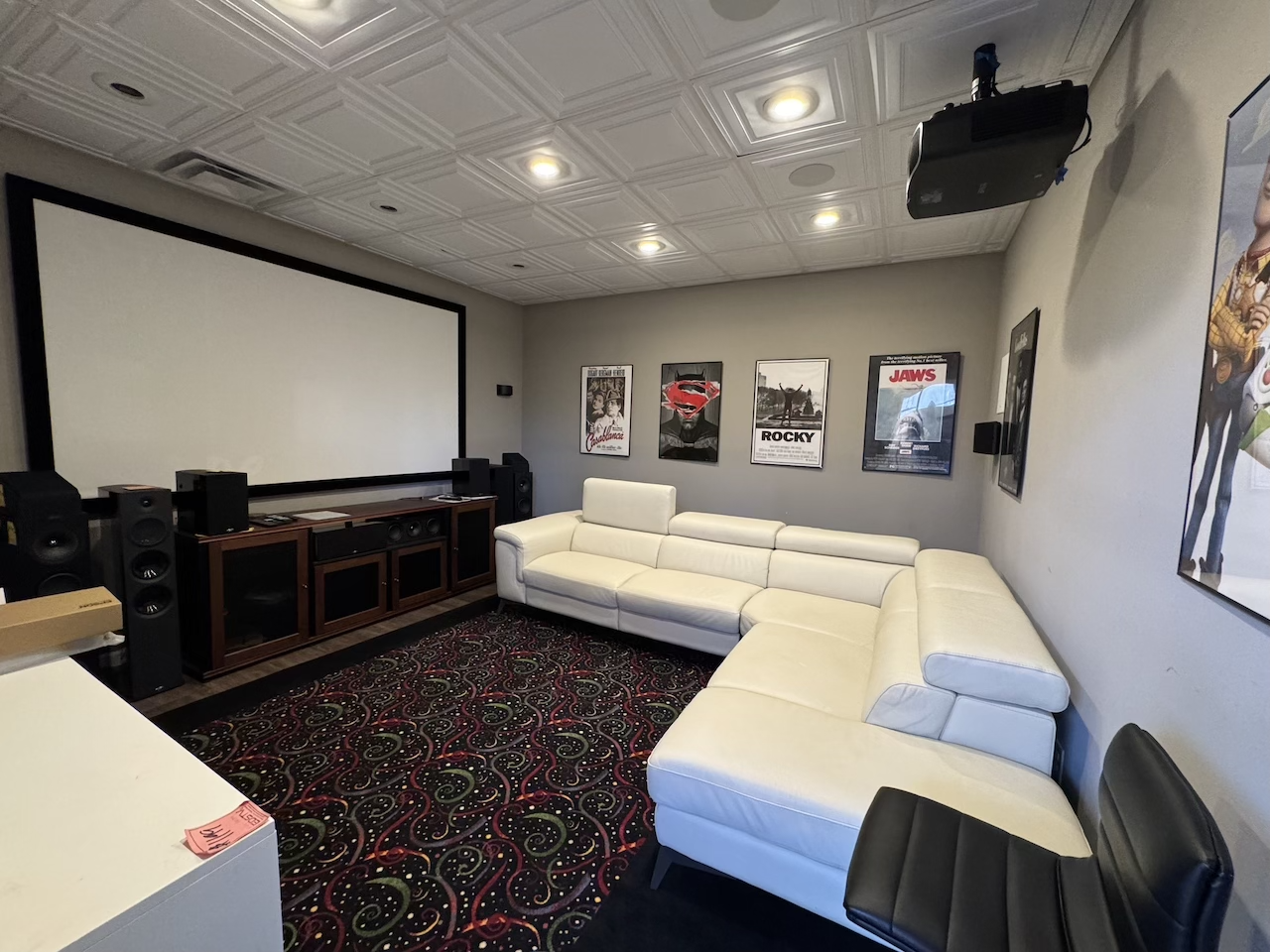
Jim Fossile: Our core brands are Epson and Sony for projectors, even though we can do other brands, but you have to pick a brand. In this room, we have an Epson 4K projector, acoustic transparent screen. We give people the feeling, if you’re looking into a theater, give them options of review and look at which it’s not, doesn’t come cheap. A lot of people don’t have this luxury of having the showroom where you can demonstrate multiple different models of speakers.
But the projector system set up that are through Control4 that are automated, I can operate it from my phone and I show people how easy it is. I can do lights dimming, lights, create scenes. The ability to demonstrate is very powerful. The fact that we have this makes it easy to channel a customer into the knowledge we have. And then the category of demonstration gives the ability, so customers can make an educated buying decision because customers don’t know what they want. I mean, they think they know what they want, their friend has it, but they see when they come into the showroom, they feel confident that we’re their guy because we touch all the things that they have concerns with.
Rob Stott: I know you mentioned obviously the ability to work with another business to build these spaces. Talk about the approach to the showroom, and how often are you looking to evolve it or does it change frequently or is it really product launch based or anything like that?
Jim Fossile: I mean, right now the big thing now is 98 inch TV, which started now, Samsung has down at four grand, which dilutes the projection business a little bit. Someone told me through the grapevine that Best Buy is abandoning two-piece projectors and screens because of the integration of mini LED walls and the 98 inch and now TCL has the hundred and some inch screen. Everything is becoming more media rooms. So with the laser projectors, you could do a little brighter image so you use high contrast screens so you could have ambient light on in the room. Still enjoy the room and eat food and entertain without being a total darkness like a real movie theater. That’s where the category is changing with the big flat panel now where 100 is maybe big enough for them people, unless they want to go bigger, 120, 130.
Rob Stott: Right.
Jim Fossile: You run into a situation where you want something bigger, then you have to go to either laser short throw. With a laser, now you have brighter images so now you can get the ambient light higher in the room and still see the picture. The category of the manufacturers understand that their model is what they got to sell, what customers want is changing so they’re developing their product lineup to coincide with what people are buying. That’s where manufacturers lead you because they know if it doesn’t sell, they’re sitting with inventory.
Rob Stott: Right.
Jim Fossile: If it doesn’t sell, they’re making it. So if no one’s buying it, why make it?
Rob Stott: Right.
Jim Fossile: They changed their model production to fit the customer’s needs, so that’s where you use the manufacturer’s lead in that category.
Rob Stott: Gotcha. You mentioned it too, right? Being able to bring a customer here or have them meet you here to go through some of these, whether it’s the rooms or just see what they don’t know what they want, right? Until they see everything in person-
Jim Fossile: It’s funny so-
Rob Stott: Able to touch it.
Jim Fossile: You get customers that call us on the phone, they want a consultation. We go out to the customer’s house, no charge, okay. You meet and greet and you see, and then you tell them they have to come to the showroom. You could put it together a plan. There are customers that don’t want to come to our showroom, they just want us to pick stuff out for them. But in the showroom, you can explain in depth what their buying decision is and they can see it live. The showroom does have that ability to educate the customer. Maybe you can grow the ticket, maybe what you were going to install wasn’t what they thought they wanted, they got to shift gears. But that’s what you have, and you can show them the integration of the lighting and try to grow the ticket. The idea is to grow the ticket, not just a simple project, turn it into something.
Rob Stott: Right.
Jim Fossile: Since we’re here already, you might as well just do this, this, and this, you know what I mean? So sometimes it backfires, but we’ve been good with it.
Rob Stott: No, that’s awesome. So what are you looking to in the future? I don’t want to take up too much more of your time, but I want to make sure I get the chance to ask you about, you’ve seen a lot of evolution in this space. I know you mentioned some of the products you think that are really driving business. But as you look ahead-
Jim Fossile: There is a category of business that we didn’t touch upon, which I scratched my head to figure this out, is the outdoor living. With the Terrace TV and the SunBrite, we always carry them. But talking about a category that, again, scratch your head, someone installing a $10,000 TV outside in the elements, not be afraid of someone ripping it off.
Rob Stott: Right.
Jim Fossile: These customers that just have, they want a TV everywhere in a room, inside and outside. So now you have the integration of the Sonance speakers and we do Paradigm, outside listening to music and you create a little paradise outside your residence. I think COVID had a lot to do with that when people couldn’t leave, it really accelerated the outdoor TV business. But the TV outdoor TVs aren’t cheap, which is a good thing because now you’re selling $3500, $4500, $10,000 outdoor displays, and then you have to do the installation, you got to get electric so the ticket just grows exponentially. They need an audio solution because you can’t hear the thing, got external speakers because it’s not loud enough. So that’s a whole category of they’re really, it just.
Rob Stott: And in a market where we are seeing all four, to your point, the elements, we’re seeing all four seasons here.
Jim Fossile: The idea there is that people, it just in spring when you think things are getting soft, all of a sudden, “I’ll take one of those Terraces, I’ll take a 65 Full Sun Terrace for six grand and then install it.” Okay.
Because again, things going outside, and knowing they could put an indoor TV outside for a thousand dollars because you can’t watch it. But customers have the financial ability to dump that kind of dough into an outside display, it’s not for everybody because it’s big bucks. But we’re the guy that does that. I mean, there’s a lot of Ferraris being sold, a lot of Porsches being sold.
Rob Stott: Right.
Jim Fossile: And a lot of outdoor TVs being sold. We’re the guy that can provide that experience with knowledge and confidence that it’s going to be done right.
Rob Stott: No, that’s awesome. What do you hope next for your business? We talked about where you think it’s going, but what do you hope to see moving forward?
Jim Fossile: Well, I think micro-LED is going to be hot if they can get the price down. We build the wall with the modules, so now you going bigger and brighter. But customers, again, they’re running out of space in their houses. I just say that the integration of smart houses, we just set up a house, which was frustrating. Guy went Google. He went Google, talk to Google. Google play this, Google do that, Google do. It’s frustrating to work with because you can’t never charge enough because you’re doing something a customer can normally do. But voice integration, we have it now now Control4, the voice integration, Control4. Talking to Google or Alexa to have it do the automated things that you normally would push a button on a remote control for. That gets more tightened up.
But people still want TVs installed, people doing media rooms. People enjoy their homes so whole house audio. And then of course, the category that really I touched on before was video surveillance where people want to feel secure in their own environment. Even though there’s Blink cameras and there’s some less cameras out there which is do it yourself, it doesn’t give you a full view all the time so you hard-wire them.
Our customer that’s buying that 7,000 TV outside, “Would you like to have a camera?”
Rob Stott: Right, make sure.
Jim Fossile: Eyeball on that camera.
Rob Stott: Right on that.
Jim Fossile: You can see the guy in the hoodie take it.
Rob Stott: Makes perfect sense. It’s a nice add-on.
Jim Fossile: Yeah. Protect your environment, hopefully your portion of the driveway.
Rob Stott: Absolutely. No, that’s awesome, legit. This was a lot of fun, man. Like I said at the top, appreciate you having me in and give me a little spin around the showroom and a little history on Ed’s TV so this was a lot of fun.
Jim Fossile: Beautiful, yeah. 40 years.
Rob Stott: Yeah.
Jim Fossile: Never a day. There were some financial situations that were touch and go, but you know what? God prevails.
Rob Stott: No, that’s incredible. Well, we appreciate it and great having you as a member and look forward to-
Jim Fossile: Yeah, the buying group has been great to me. I mean, they gave me a lot of Mitsubishi money back in the day, rebate money. That’s why I joined the group was that I got 1% on Mitsubishi. $2 million, that’s $20,000, that covers the dues.
Rob Stott: Yeah.
Jim Fossile: I think that was back in early 2000s. And then of course then, I mean, I get great support through the other brands too. And now they host our website with RWS.
Rob Stott: Yep.
Jim Fossile: And do the rebates. Now we’re doing, we got finally signed up again for the extended warranties.
Rob Stott: Awesome.
Jim Fossile: We’re trying to make that another profit category, but.
Rob Stott: Incredible. Keep leaning into it.
Jim Fossile: You try hard. If you fail, try again.
Rob Stott: It’s a great message and a great one to end on. We appreciate it and look forward to catching up down the line here.
Jim Fossile: Another day in paradise, that’s all I can say.
Rob Stott: Absolutely. Hey, thank you.
Jim Fossile: Thank you for having me.

